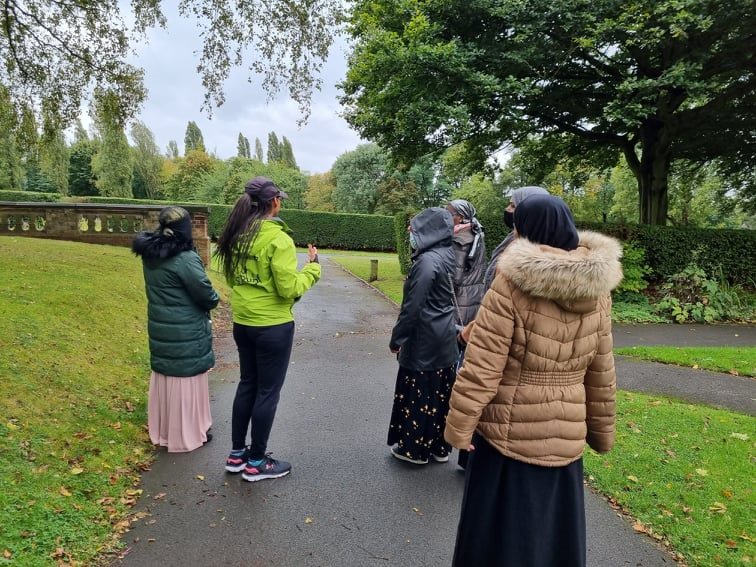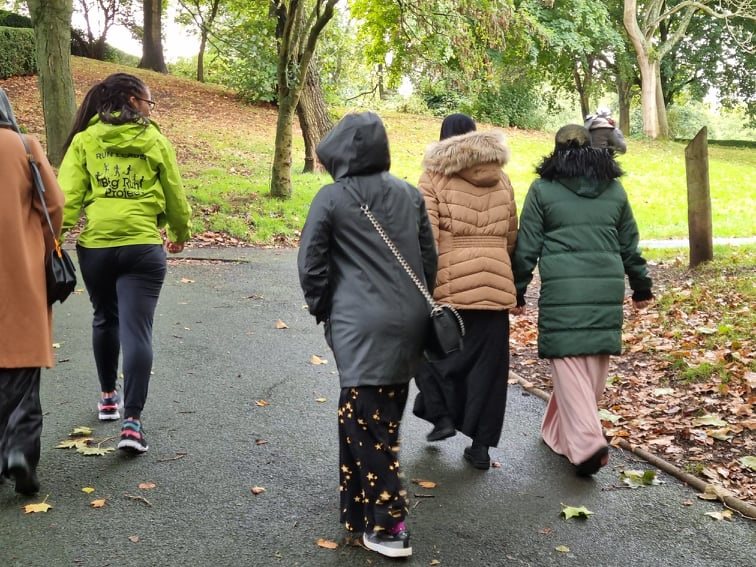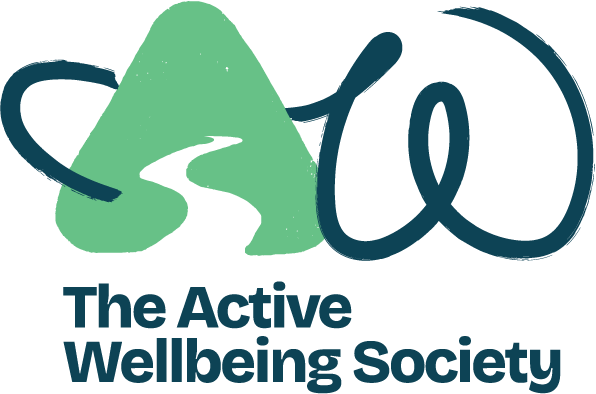

During Black History Month, we are shining a light on the work our colleagues are doing to celebrate Black heritage and culture. This week, we spoke to Sally, our Run and Walk Coordinator, who organises and delivers a range of activities, such as The Book Project, Social Prescribing walking groups, social running groups and Couch to 5K sessions. She told us about how the Walking Book Group, a new part of The Book Project, are exploring Black literature as their theme for Black History Month.
Sally created The Book Project during lockdown as a way for people to be able to share and donate books while libraries, bookshops and charity shops were closed. The project gives local people the opportunity to donate and exchange books, as well as discuss them on the Facebook group or in person.
More recently, Sally has set up a Walking Book Group at All Saints Church in Small Heath, with support from the food team. She explained that the idea of the group is to ‘Get people out, walking, using the book as a conversation starter’, while also enjoying the nature alongside the canal and local parks. The group meet at the Church, browse the books which have been donated to The Book Project, select ones they want to read and keep, then go on a walk and discuss what they’re reading. Afterwards, they come back to All Saints Church, where they can enjoy a hot drink and a meal at our Community Café.
The Book Project idea is based on the 5 ways to wellbeing; it gives participants the chance to learn new things, share resources, build social connections, spend time in nature, as well as become more physically active. Sally explained that taking part is good for your mental wellbeing as it ‘kind of takes people out of themselves a little and gives their head a bit of space to breathe.’
During Black History Month, the group are looking at books which are linked to Black history and identity. Sally explained they are using books which have been donated from The Book Project which have ‘got Black characters in them, books written by a Black author, biographies, autobiographies.’ They will have the chance to discuss and share the things they’ve read and learnt and reflect on the role of Black History Month.
Last year, Sally read ‘Why I’m No Longer Talking to White People About Race’ by Reni Eddo-Lodge, which discusses structural racism, race relations and the problems which arise when discussing experiences of racism. She reflected that it taught her a lot about the origins of certain stereotypes and racism. This made her more aware that,
‘Black History Month is really important because it helps people to talk about issues and about where things have come from. I’ve been shocked, learnt new things, and have had to sit in discomfort from what I’ve read and from reflecting on some of the things that have just become part of my way of life.’
Reading and sharing books can help people to understand and make sense of history, to rethink their preconceptions and learn new ideas. Sally explained that conversations about race can be challenging and uncomfortable, and that sometimes a book can better communicate what you’re trying to say. With topics such as white privilege and institutional racism, she said ‘it’s really difficult to try and explain that, and I don’t like to be the one to do it. So actually, I’d much rather go. “Do you know what, read this”’.
Sally feels that reading about and reflecting on Black rights is particularly important in the context of the Black Lives Matter movement and the murder of George Floyd in May 2020. She explained that in general she doesn’t really like talking about race. ‘I didn’t want to be the fighter because it’s uncomfortable, like to sit in that space is really uncomfortable, but actually it’s important.’
However, she also said that ‘We shouldn’t feel uncomfortable talking about race’ and we all have a role to play in tackling racism.
‘I don’t always want to be the person that’s doing the fighting. But then, if you don’t do it, then nobody does, and so you’re in that horrible position. I would really like just to be on the side-lines and not have to think about it. But I am Black and actually this doesn’t just affect me, it can affect other people. And maybe if I don’t speak about it, other people might not understand or might not see how they are talking or how their actions affect other people and so on.’
This year, the theme for Black History Month is ‘Proud To Be’. It invites Black and Brown people around the UK to share what they are proud to be – for a festival of celebration in October. With some reflection, Sally told us that ‘I’m proud to be Black British, a Black British bookworm.’
During Black History Month, we have a range of virtual and in-person activities celebrating black culture, history, and identity, such as Black heritage walks, Caribbean food live cook-a-long videos, and Afro-beats dance classes. To find out more about what’s on visit our virtual timetable.

